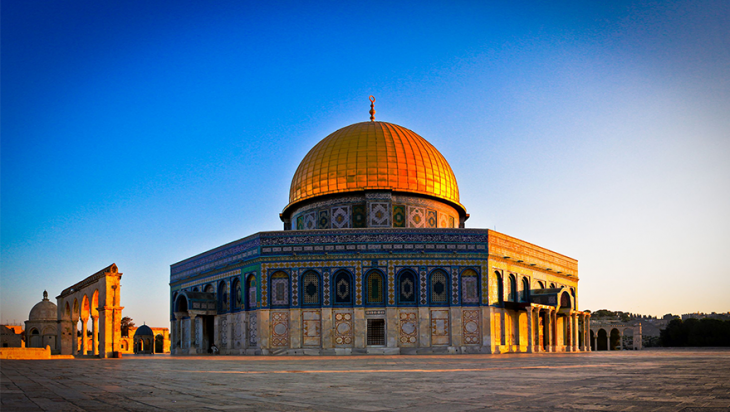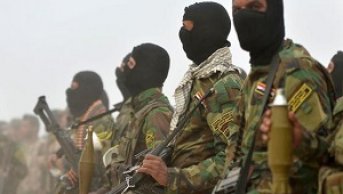Israel Hits Itself with Its Own Arguments

Donald Trump, the most controversial President of the United States, announced that he was on the Israeli side and that he wanted to move the American embassy in Tel Aviv to Jerusalem, which would be in line with Netanyahu’s conditions. This essentially means that the peace process will not take place. And the message Trump gave to the Palestinian people was "the two-state solution is over." Trump did not give anything to the Palestinians in return of the recent step he has taken, and even weakened the US commitment to the establishment of a Palestinian state sooner or later. Trump's speech seemed to have been written by Netanyahu and Ron Dermer, Israeli Ambassador in Washington, and was prepared probably in close coordination with them.
Hamas called for an uprising. However, if any serious political support is not received from the member states of the Organization of Islamic Cooperation (OIC) and the West, no Intifada will change the situation: That is to say, the dominant player would still be Israel while the party that is dominated and given no help would remain Palestine. One of the ultimate goals of the Israeli officials is to command Palestine and the Palestinians whom it has oppressed for many years, and to impose Jerusalem as its capital on the entire world. It is necessary to know Israel's "basic strategies which consist of no strategy except for waiting". It is also required to consider the support of the strong and effective diaspora outside.
Considering the fact that Trump has pulled the pin out of the grenade, Netanyahu does not seem to have anything to do except to wait. The moderate soul of Fatah and the insurgent spirit of Hamas accused of extremism till now are slowly extinguishing due to internal divisions between them and the defeats they suffered like beads-on-a-string; not to mention the dispute and even the armed struggle between these two political powers. Criticizing Fatah and Hamas from now on will make the problem even more insoluble. Even though it is said that there exists no solution except for waiting, Netanyahu has an objective he has been pursuing for many years: To disintegrate and radicalize the Palestinian national movement. Unfortunately, this objective cannot be said to be failing so far.
The "strategy of waiting" gives Netanyahu two opportunities: First, Israel has no longer had a real, de facto enemy. Since it had the nuclear power, no country considers its power to be enough for a struggle against Israel. Just as the US is no longer able to invade North Korea, no state thinks of attacking Israel.
Having firmed up its military supremacy after several decades, Israel has struggled for not letting any other regional country to develop a nuclear program in the Middle East. This is the reason why Israel imposed the Begin Doctrine, which was named after the Israeli Prime Minister in June 1981, following a surprise air strike on the Osirak nuclear reactor in Iraq on suspicion of a development of mass destruction weapons. The Doctrine says the Israeli government has reserved the right to bomb every regional enemy that is in the search for nuclear power. Once, Syria was a real threat to Israel as it was Putin's manor. Netanyahu went to Moscow six times in 2016 as his relationship with the former US President Obama was bad. It was then the first country to sign an agreement upon Syria with Putin. But now Syria has turned into debris. In fact, Bashar Assad asked for an agreement from Netanyahu to ensure that Israel’s violent acts against Syria would decrease. Israel, on one hand, thinks of the given request, and bombs, on the other, the field where Iran wants to establish a military base, just a few kilometres far from the Syrian capital Damascus.
The Peace Process Becomes a Rhetoric Exercise
Proclaiming Jerusalem as the capital of Israel, Trump starkly revealed the fact that the principal dynamics in the Middle East were based on weapons. Since there is nothing left for Israel to ask for from those who are hostile to it because of the way the power relations have developed. The peace process in Palestine has only been a rhetorical exercise
Israel once wanted security in return for the occupied territories, but now it is one of the safest countries in the world. It sees herself virtually unassailable. It is uncontroversial that the transfer of the American embassy to Jerusalem will throw the region into the fire. Nevertheless, even in the fire circle, there is no Middle Eastern actor which can change the existing power relations. If Iran tries to hit Israel, it would be targeted by Trump who uses the whole energy he has to provoke Iran. This situation relieves the Israeli government.
The only country that could have a real political weight stands out as Turkey. Even though Turkey, as a NATO member, has a unifying force, Israel that is at war since 1948 knows that the guns would not be targeted at it and it has no fear. However, the policies to be adopted in this process by Turkey, the only country that has won a political and judiciary victory following the Mavi Marmara case will exert pressure on Israel.
There are two main points that Netanyahu cannot see and evaluate properly. The first is the Begin Doctrine declared in 1981. It is a practice that Israel can use against countries that carry the risk of using force against it. However, what Netanyahu administration should see is that when it comes to Jerusalem, organizations that have different ideological codes in the Middle East and receive financial and logistical support from various countries can regard Israel as a common target. Hezbollah, al-Qaeda and other 37 organizations could be headed towards Israel. The situation can be much worse than in the 70s.
The second critical point is that it is rare to see the Muslim world act in common. Trump made this unusual situation take place. At least for now, the Muslim world is showing a unity. Trump’s move to define Jerusalem as the capital of Israel has irritated everyone in a similar way and surprisingly Iran and Saudi Arabia, two enemies, seem to be on the same page. Besides, Washington frequently receives warning messages. After the Jerusalem crisis, the rapprochement between Egypt, Saudi Arabia, Jordan and Israel will also be damaged. This could jeopardize the Camp David Accords.
Trump's pro-Israeli attitude is not a simple propaganda product. While Israel increased its power from day to day since 1967, its enemies created their own weaknesses. The fury Saudi Arabia and Qatar had against Assad’s Syria in the context of the Syrian civil war also created a weakness in this region. Once, the states that marched in unity to tear down Israel did not manage to form a coalition or strategic alliance to help the Palestinian movement solidify.
Erdoğan's Role to Affect the Political Process
The defender of the Palestinians in the Jerusalem crisis is not an Arab leader with high eloquence but the President of Turkey, Recep Tayyip Erdoğan. For Erdoğan, the Jerusalem issue is not just a matter of heart. In the fight against the recognition of Jerusalem as the capital of Israel, Erdoğan placed himself to the spokesperson position of the Muslim world. This stems from Erdoğan's current presidency in the OIC which consists of 57 states and recognizes itself as the "collective voice of the Muslim world". Due to the Jerusalem crisis Erdoğan gathered the OIC in Istanbul. The results are quite substantial.
Since the outbreak of the Jerusalem crisis, Erdoğan plays a double role as the President of Turkey and the term chairman of the OIC: Addressing President Donald Trump as "Mr Trump Jerusalem is the red line of Muslims," Erdoğan stood shoulder to shoulder in this crisis with the Jordanian King Abdullah II whom he recently welcomed in Ankara. With this attitude, Erdoğan began to see support not only from his own public opinion but also from the public opinions of other Muslim countries.
However, it is already clear that this situation has not been welcomed by all Muslim countries. After King Abdullah II’s return to Jordan in the wake of his visit to Turkey, which followed the US decision concerning Jerusalem, it was learned that the Saudi Arabian authorities warned the Jordanian Foreign Ministry of the anti-US/Saudi Arabia protests that remarkably increased in the country. On the other side, it was heard that the Jordanian officials from the Ministry of Foreign Affairs were to meet some officials from the Ministry of Foreign Affairs of Saudi Arabia which is trying to keep the Jerusalem process under control by exerting economic and political pressure upon the Jordanian administration, in Amman a day before the OIC meeting to be held in Istanbul. Jordanian diplomatic sources are of the opinion that the Saudi effort to make Jordan accept its own agenda before the OIC meeting in Istanbul will continue by putting pressure on Amman.
The Jordanian-Saudi meeting is not to take place synchronously only with US President Donald Trump's perilous decision about Jerusalem, but it also coincides with a visible difference between the Jordanian attitude to increase the tension by means of all diplomatic channels and the Saudi silence.
Political sources are expressing an interesting claim about the Saudi administration’s being silent during the Jerusalem crisis. For, according to the Jordanian sources, Mahmoud Abbas leaked the short dialogue the President of the Palestinian Administration had with the Saudi Crown Prince Mohammad bin Salman, and Salman, in the given dialogue, told Abbas that "turn the Jerusalem page, don’t mention about the right to return and the refugees; focus on a state in Gaza, then you will have lots of money.” President Abbas, before counting Jordan in, is said to have told the Saudi King: "Your Majesty, send me a written document so that I can hand it out to the governing body of the Liberation Organization and get what you want." I have also responded with the words of the administration of the Liberation Organization,
Erdoğan has conducted serious and intense telephone diplomacy: He showed his willingness to discuss the issue with Pope Francis, Russian President Vladimir Putin, Pakistani President Mamnoon Hussain and many EU governments. Erdoğan's rationale is: "This is not just about Muslims, but about humanity." In fact, this attitude should be considered as a prevention of a total war between civilizations or religions in the Middle East in advance of the processes some results of which may be seen in the future.
The Turkish President is not backing up the Palestinians just because the conditions are appropriate and almost the entire World is against Trump’s decision on Jerusalem. Erdoğan has been struggling for years for the cause of his co-religionist in the Gaza Strip and in West Jordan. Following an ice age in their relations that had lasted for years, Turkey and Israel, signed a peace treaty in June, 2016. Within the framework of this agreement, Erdoğan also made the Israeli accept the Turkish aid shipment to the Gaza Strip that is ruled directly by Hamas.
The Jerusalem crisis will not only provide the Erdoğan government that does not have a very good relations with many countries with an opportunity to reveal itself in the international arena but also be the voice of the silent majority in the Middle East and Europe who cannot react to the current situation.





